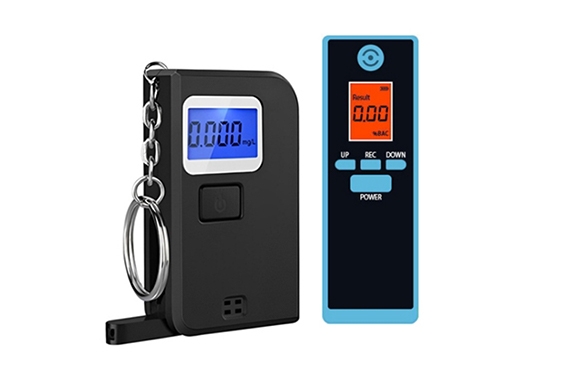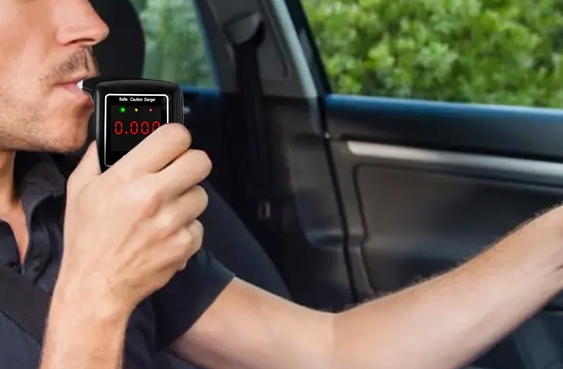With the increasing emphasis on road safety, workplace regulations, and personal health management, alcohol testers have become essential tools in various aspects of modern life. Whether you are an employer concerned about workplace safety, a driver aiming to comply with DUI laws, or an individual seeking to monitor your own alcohol consumption, selecting the right alcohol breath tester is crucial. However, with the variety of models, functions, and technologies available on the market today, many people find it challenging to make the best choice. This article will serve as a guide to help you understand how to choose a suitable alcohol tester breathalyzer according to your specific needs.

What is an Alcohol Tester?
An alcohol tester, commonly referred to as a breathalyzer, is a specialized device used to measure the concentration of alcohol in a person's breath, which is then used to estimate their blood alcohol concentration (BAC). These devices are widely used by law enforcement officers during roadside checks to determine if a driver is over the legal alcohol limit. Alcohol testers typically function through a chemical reaction or electronic sensor that detects the presence of ethanol molecules in the breath. When a person exhales into the device, the sensor analyzes the breath sample and provides a digital readout of the estimated BAC. Some testers utilize fuel cell sensors, which offer high accuracy and are often used in professional or legal settings, while others may use semiconductor sensors, which are more affordable and generally intended for personal use.
In addition to law enforcement, alcohol breath testers are commonly used in workplaces, hospitals, and rehabilitation centers to monitor sobriety or ensure compliance with alcohol-free policies. Many modern digital alcohol testers are compact, portable, and easy to operate, providing quick and reliable results within seconds. Some advanced models even feature Bluetooth connectivity to smartphones, enabling users to track their results over time. With the rise of personal health awareness, alcohol testers are increasingly popular among individuals who want to monitor their own drinking habits to ensure they stay within safe and legal limits.
Understand the Purpose of Alcohol Tester
The first step in selecting a suitable alcohol breath analyser is identifying its intended purpose. Different users will require different features based on their specific scenarios. Below are the most common use cases:
Personal Use:
Individuals may wish to monitor their blood alcohol content (BAC) after social drinking to ensure they are within legal limits before driving or operating machinery. In such cases, a compact, easy-to-use device with moderate accuracy is typically sufficient. Personal alcohol testers are available in a variety of models, ranging from keychain breathalyzer to more advanced digital devices with LCD displays and app connectivity. They are simple to operate, usually requiring just a single breath and a few seconds to provide an accurate reading. Using a personal alcohol tester breathalyzer offers peace of mind and promotes responsible drinking habits. It helps individuals make informed decisions about their actions after drinking and reduces the risk of legal issues or accidents caused by impaired judgment.
Professional and Workplace Use:
Companies, especially those in transportation, construction, or heavy machinery industries, may need alcohol testers for routine employee testing to maintain workplace safety. These require higher accuracy, certification compliance, and possibly data storage functions. Professional-grade alcohol breath testers typically feature high-precision sensors, rapid response times, and user-friendly interfaces to deliver accurate and reliable results. Many models also offer data storage, Bluetooth connectivity. By providing precise and reliable readings, these testers help organizations maintain strict alcohol policies and safeguard the wellbeing of employees and the public.

Key Factors to Consider When Choosing
- Accuracy and Reliability. Accuracy is the most critical factor when choosing a breath alcohol tester. A reliable device ensures the BAC reading is precise and consistent, which is especially crucial in legal or workplace contexts. Professional-grade breathalyzers typically use fuel cell sensors, known for their high accuracy and stability over time. Semiconductor-based sensors, while more affordable, may produce less consistent readings and can be affected by environmental factors such as temperature and humidity. Therefore, users should assess the level of precision required and select a model that meets those standards.
- Type of Sensor. Alcohol testers generally come with two types of sensors: semiconductor sensors and fuel cell sensors. Semiconductor sensors are common in entry-level and personal breathalyzers, offering cost-effective solutions for occasional use. Fuel cell sensors, on the other hand, are favored in professional environments because of their higher accuracy, better sensitivity to alcohol, and reduced risk of false positives. Understanding the differences between these sensor technologies can help you select the right device for your intended application.
- Measurement Units and Range. Make sure the device can measure in the units you need, such as BAC (%), mg/L, or g/L. Additionally, check the range of detection. Some models are only effective within certain limits.
- Size and Portability. Compact devices are ideal for carrying in a pocket or glove compartment. Larger, more robust models might be better suited for stationary use in workplaces.
- Ease of Use and Maintenance. A user-friendly interface, clear digital display, and simple operation enhance the convenience of using a bac alcohol tester. Devices with features like one-touch operation and audible prompts can reduce user error. Maintenance is another consideration. Disposable mouthpieces promote hygiene and reduce the risk of contamination, while battery-powered models ensure consistent performance with easily replaceable or rechargeable batteries. Proper storage in a dry, clean environment also helps to extend the device's lifespan and reliability.
Conclusion
Choosing a suitable digital breath alcohol tester requires careful consideration of your intended use, desired accuracy, and budget. Personal users may prioritize portability and ease of use, while workplaces require compliance with safety standards and accurate data recording. SISCO Online Shop offers a variety of types of alcohol testers, such as wall mounted alcohol breath tester, mini usb alcohol tester and so on. You can make a choice based on your specific needs. Or if you have any other questions, please contact us.
Whether you are safeguarding your health, complying with regulations, or protecting others, a reliable bac alcohol tester is an invaluable tool for responsible alcohol consumption management. Through this article, hope you can make an informed decision that ensures safety, compliance, and peace of mind.

